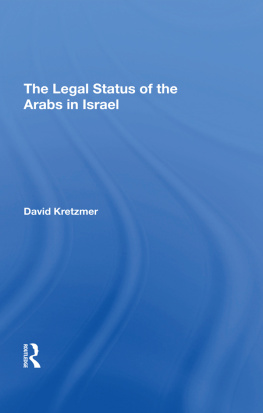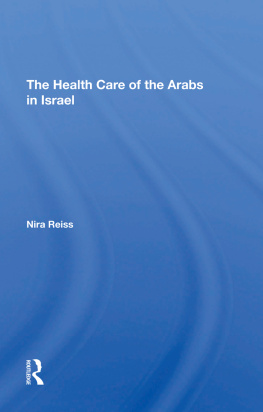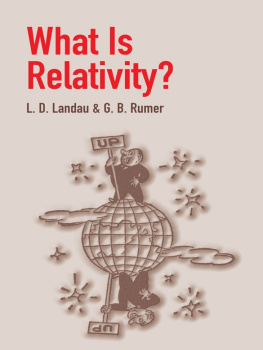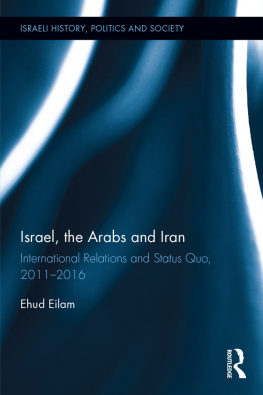ROUTLEDGE LIBRARY EDITIONS: POLITICS OF THE MIDDLE EAST
Volume 5
THE ARABS IN ISRAEL
THE ARABS IN ISRAEL
A Political Study
JACOB M. LANDAU
Issued under the auspices of the Royal Institute of International Affairs
First published in 1969 by Oxford University Press
This edition first published in 2016
by Routledge
2 Park Square, Milton Park, Abingdon, Oxon OX14 4RN
and by Routledge
711 Third Avenue, New York, NY 10017
Routledge is an imprint of the Taylor & Francis Group, an informa business
1969 Royal Institute of International Affairs
All rights reserved. No part of this book may be reprinted or reproduced or utilised in any form or by any electronic, mechanical, or other means, now known or hereafter invented, including photocopying and recording, or in any information storage or retrieval system, without permission in writing from the publishers.
Trademark notice: Product or corporate names may be trademarks or registered trademarks, and are used only for identification and explanation without intent to infringe.
British Library Cataloguing in Publication Data
A catalogue record for this book is available from the British Library
ISBN: 978-1-138-83939-7 (Set)
ISBN: 978-1-315-68049-1 (Set) (ebk)
ISBN: 978-1-138-93001-8 (Volume 5) (hbk)
ISBN: 978-1-315-68059-0 (Volume 5) (ebk)
Publishers Note
The publisher has gone to great lengths to ensure the quality of this reprint but points out that some imperfections in the original copies may be apparent.
Disclaimer
The publisher has made every effort to trace copyright holders and would welcome correspondence from those they have been unable to trace.
THE ARABS IN ISRAEL
A POLITICAL STUDY
Jacob M. Landau
Oxford University Press, Ely House, London W. 1
GLASGOW NEW YORK TORONTO MELBOURNE WELLINGTON
CAPE TOWN SALISBURY IBADAN NAIROBI LUSAKA ADDIS ABABA
BOMBAY CALCUTTA MADRAS KARACHI LAHORE DACCA
KUALA LUMPUR SINGAPORE HONG KONG TOKYO
Royal Institute of International Affairs, 1969
PRINTED IN GREAT BRITAIN
For
Zipora, Ronit, and Iddo
CONTENTS
CBS: | Central Bureau of Statistics |
JP: | Jerusalem Post (Jerusalem, daily). |
M: | Ha-Mizra he-adash (Jerusalem, quarterly). |
MK: | Member of Kneset. |
Moslems, Christians, & Druzes: | Israel, CBS, Moslems, Christians and Druzes in Israel, data from stage a and b of Census, 1964. |
NO: | New Outlook (Tel-Aviv). |
Stat. Ab.: | Statistical Abstract of Israel |
YA: | Ydt aarnt (Tel-Aviv daily). |
YSY: | Yarn sat l-Yisrael (Israel statistical monthly). |
ONE of the major problems in the political life of every polyethnic State is the relationship between majority and minoritya relationship which conditions nearly every aspect of society. This is particularly true of new States, where this relationship determines both the formal structures of the political system and the patterns of political behaviour.
Understanding this relationship requires thorough knowledge of the characteristics of both majority and minorities. While much has been written about the Jewish majority in the State of Israel, only little has been published on the Arab minority. Indeed, many articles dealing with the Arabs in Israel may be found in periodicals and in the daily press, but most of these are journalistic in nature, since they refer mainly to the temporary and transitory.
Books which discuss the Arabs in Israel are either general accounts by tourists,1 or short informative publications by government agencies,2 or political propaganda by various interested groups.3 The social4 and economic5 aspects of the Arabs in Israel, with many of the statistical data and demographical implications involved, have been adequately dealt with by a number of scholars. In contrast, the special political problems of the Arabs in Israel have not yet been exposed to systematic research. This phenomenon is not surprising, due to two reasons: firstly, because many of the Arab politicians who lived in Palestine during the British Mandate did not remain here after the establishment of the State of Israelon 14 May 1948and many of the Arabs who did stay on revealed, in the first years of the States existence, a considerable amount of indifference to political affairs. Secondly, when in recent years, a growing number of Israeli Arabs began to participate in politics increasingly, objective study of their political behaviour became comparatively difficult, because of the deep feelings involved in every discussion on this subject. It is not surprising, that these feelings were related (at least in part) to considerable ignorance of the subject.
This study does not claim to give a complete answer to all the questions relating to the political behaviour of the Arabs in Israel, and a fortiori does not aim to present an overall picture of the various aspects of their life. In the present condition of research about this subject, this first contribution to so comprehensive a theme can but hope to describe and analyse several significant phenomena relating to the political behaviour of the Israeli Arabs, based on available materials, and then attempt to reach some intermediate conclusions.Moreover, the partisan approach prevailing in many of the publications touching on the Arabs in Israeli politics has put considerable obstacles in the way of objective research. Nevertheless, I have striven to keep a balanced approach, without any bias. One may be permitted to hope that better knowledge of the subject will contribute to a rapprochement between Jews and Arabs.
As to the period covered in this study, it was determined by the nature of the subject. As a starting point I chose 14 May 1948. It was then that the State of Israel was officially proclaimed and the Arabs became a minority group in the new State; furthermore, as will be shown, the Arabs in Palestine (that is, before 1948), have already been studied by various scholars. As to the terminus ad quem, the end of the year 1966 was originally decided upon, as the date when the military administration in all Arab areas was terminated. The six days war in June, 1967, changed the situation markedly, by bringing another million Arabs within the orbit of Israeli rule. When this happened, the manuscript of the present study was almost complete, and could not take into account changes which necessitate the preparation of another full-sized book. As to the Arab minority living in Israel prior to the six days war, their loyalty to the State during this war remained unflinching, with very few exceptions.6









